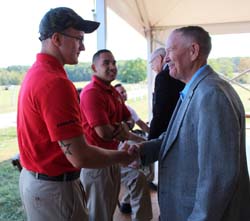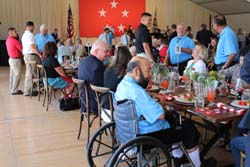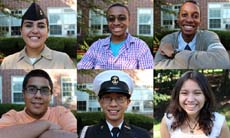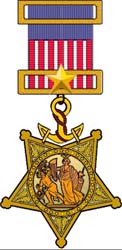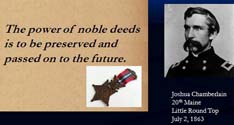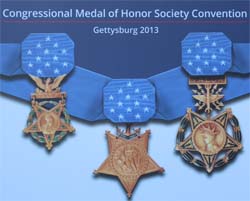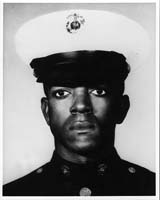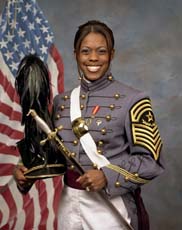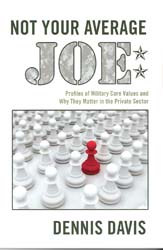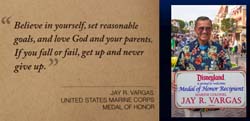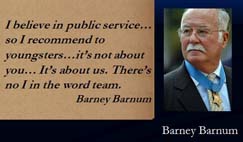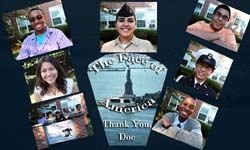Written by Kitch Loftus-Mussari
Photographs by Kitch Loftus-Mussari
Copyright Mussari-Loftus Associates, LTD 2013
All Rights Reserved
It was a glorious September afternoon when the buses pulled up to the luncheon tent at the historic Eisenhower Farm in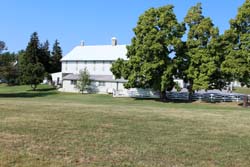 Gettysburg. This is the place Ike and Mamie called home. It was their refuge from the pressures of public life, and it was the place where President Eisenhower hosted several important meetings including his much publicized September 1959 visit with Soviet Premier Nikita Khrushchev.
Gettysburg. This is the place Ike and Mamie called home. It was their refuge from the pressures of public life, and it was the place where President Eisenhower hosted several important meetings including his much publicized September 1959 visit with Soviet Premier Nikita Khrushchev.
The Medal of Honor recipients and their families stepped off smartly and headed into the pavilion where tables were beautifully decorated to fit the occasion. On their way, the recipients stopped to return the salutes they received from a voluntary honor guard of six Navy Junior ROTC cadets from North Plainfield High School in New Jersey.
Waiting to welcome the recipients was a group of Wounded Warriors from Virginia. Wearing bright red shirts, they huddled together in back of the tent. They gave testimony to the scars of war and their determination to rebuild their lives. There was a quiet dignity about these young veterans. For me, watching them interact with heroes from World War II, Korea, Vietnam and Afghanistan was one of the most compelling moments of day.
In many ways, the atmosphere of the luncheon was just like a family reunion. People chatted with one another. There were lots of handshakes and warm hugs. The sound of laughter rippled through the crowd. Wherever you looked, people were engaged in conversation.
In the background, everyone could hear the uplifting music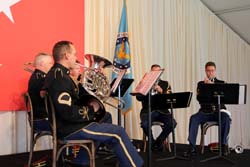 provided by the Army Jazz Quartet. Dressed in attractive blue uniforms, the quartet was strategically located on the stage just to the right of a huge background of five stars symbolic of one of General Dwight David Eisenhower’s many accomplishments.
provided by the Army Jazz Quartet. Dressed in attractive blue uniforms, the quartet was strategically located on the stage just to the right of a huge background of five stars symbolic of one of General Dwight David Eisenhower’s many accomplishments.
After the reception, everyone made their way to an assigned table. The wounded warriors from the Iraq and Afghanistan conflicts sat at various table so they could share the experience with the recipients.
The bucolic setting was a fitting place for this luncheon. It reflected a peacefulness and serenity on this late summer day. Nevertheless, everyone was aware that this was a commemoration not a celebration.
During the event, I wondered what was going on in the heart and mind of Frank Curry. He earned the Medal of Honor in 1945 when General Eisenhower was his commander. My father fought in that war and a part of him never came home.
I asked myself the same question when I saw Rodolfo Hernandez. He received the Medal of Honor 1952 for his bravery in Korea. At that time, candidate Eisenhower was running for President of the United States.
When my eyes caught the magical scene of Medal of Honor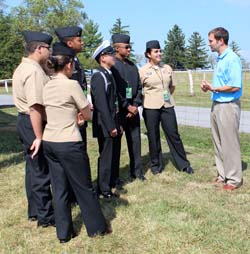 recipient Sal Jiunta talking with the six cadets from North Plainfield, I thought to myself what an irony. This young man is the first living recipient of the Medal of Honor since the Vietnam War. When I was their age, the furthest thing from my mind was meeting or having a conversation with a Medal of Honor recipient! What an opportunity. What a moment.
recipient Sal Jiunta talking with the six cadets from North Plainfield, I thought to myself what an irony. This young man is the first living recipient of the Medal of Honor since the Vietnam War. When I was their age, the furthest thing from my mind was meeting or having a conversation with a Medal of Honor recipient! What an opportunity. What a moment.
While the students were listening to Sal Jiunta and answering his questions, Tony and one of his most accomplished former students, Patrick Romano, worked in sync to capture this 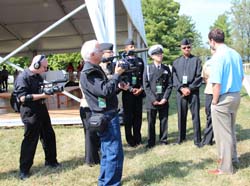 priceless, unscripted moment on video. It was a perfect illustration of teamwork. Two men who have known one another for 30 years were doing what needed to be done without regard for inconvenience or self to guarantee the success of the documentary.
priceless, unscripted moment on video. It was a perfect illustration of teamwork. Two men who have known one another for 30 years were doing what needed to be done without regard for inconvenience or self to guarantee the success of the documentary.
As this scene played out, I was watching the closing of the circle. The demanding teacher and one of his most successful students were together again. This time all of the challenges and lofty expectations of the teacher had been fulfilled and surpassed by the loyal student who is now the consummate professional.
The luncheon meal followed the rustic theme and soon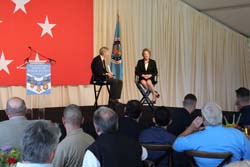 afterward, the guests settled in for an informal discussion featuring Susan Eisenhower who vividly recalled her childhood visits to her grandfather’s farm. In a compelling and dignified way she shared poignant and humorous stories filled with interesting tidbits about the man affectionately known as “Ike.”
afterward, the guests settled in for an informal discussion featuring Susan Eisenhower who vividly recalled her childhood visits to her grandfather’s farm. In a compelling and dignified way she shared poignant and humorous stories filled with interesting tidbits about the man affectionately known as “Ike.”
As the guests made their way to the buses to return to the 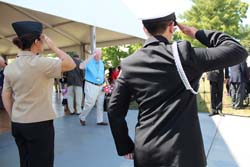 Wyndham hotel for an autograph session, smiles of gratitude filled their faces. By every measure it was an informative, relaxing and successful event for the honored guests, their families and friends.
Wyndham hotel for an autograph session, smiles of gratitude filled their faces. By every measure it was an informative, relaxing and successful event for the honored guests, their families and friends.
For the students from North Plainfield it was an extraordinary learning opportunity that they will never forget.
Please provide feedback to:
